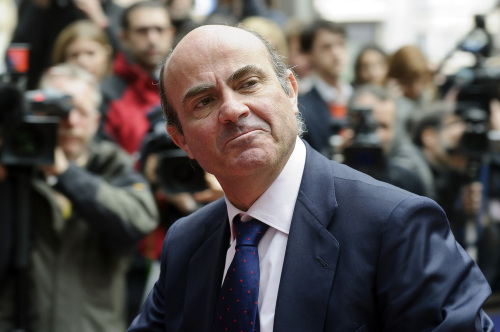 |
Luis de Guindos, Spain`s finance minister, reacts to a question from the media as he arrives for the Eurogroup meeting at the European Council headquarters in Brussels, Belgium, (Bloomberg) |
Investors worry that Spain could join the ranks of Greece, Portugal and Ireland in asking for a bailout
MADRID (AP) ― Rising concerns over Spain’s economy and its ability to handle its debts sent its cost of borrowing higher Thursday, sparking fears that Europe’s debt crisis is flaring up again after a brief respite.
Spain has become the focus of investors concerns with many worried about the ability of the government to push through a big austerity program at a time when its economy is heading for a return to recession and unemployment stands at around 23 percent.
A disappointing set of Spanish bond auctions on Wednesday has heightened investor fears that Spain could soon join the ranks of Greece, Portugal and Ireland in asking for a bailout. A Spanish bailout would be far more difficult for the country’s partners in the 17-country eurozone as its economy is twice the size of the three countries that have already needed a financial rescue.
These fears have pushed up the cost at which Spain borrows ― called the yield and which is an indicator of risk. When yields go too high, countries can’t afford to borrow on open markets and are forced to seek bailouts.
On the secondary market, where bonds are traded after they’re issued, the yield on Spain’s benchmark 10-year bonds Thursday hit a high of 5.81 percent before dropping slightly to 5.74 percent. Just a month ago the rate was below 4.9 percent. Last November, Spain’s yield hit 6.7 percent ― close to the 7 percent point where a country finds it too costly to maintain its debt and seek a bailout.
Over the past few weeks, investor concerns over Europe’s debt crisis have eased somewhat as Greece clinched its second massive international bailout and the European Central Bank pumped a trillion or so euros into the fragile banking system.
Should tensions ratchet up much higher, then investors are likely to start fretting about whether Europe has the capacity, let alone the inclination, to launch a rescue operation of a big economy, like Spain.
“Whilst the EU can organize bailouts of the smaller economies and even organize a default for Greece it faces a major challenge if the bond market continues to push Spanish bond yields higher,” said Gary Jenkins, managing director of Swordfish Research.
Despite its parlous economic state, the newly elected conservative government is pursuing what it describes as the biggest austerity drive since the restoration of democracy in 1978.
On Tuesday, Spain’s Finance Minister Cristobal Montoro spelled out the details of the 2012 budget proposal to make 27 billion euros in spending cuts and tax increases in order to get Spain’s deficit down from 8.5 percent of gross domestic product last year to 5.3 percent this year. The cuts are being introduced at a time when the country’s economy is expected to contract 1.7 percent on the year.
The government also revealed this week that Spain’s national debt will shoot up this year from 68.5 percent of GDP to about 80 percent in light of the higher borrowing costs in the markets and issues related to its regional governments.
While Spain is garnering the most attention at the moment, there are concerns that Italy could be dragged into the debt crisis mire too. In many ways Italy’s public finances are an even more parlous state than Spain’s. Its debt burden stands at a colossal 120 percent of GDP ― only Greece has a higher ratio of the countries that use the euro.
Still, Italy has also seen its ten-year yield heading higher in recent days to 5.43 percent.
Its rate, which was higher than Spain’s for a number of months, has fallen this year ― it went above 7 percent last November ― as investors appear to be impressed with the strategy of the new government, led by Prime Minister Mario Monti. His technocratic government earlier this week unveiled a series of employment reforms that would break down protected trades and make it easier for companies to hire and fire. This follows a series of stringent spending cuts.
“If the Spanish situation deteriorates, then it is highly probably that there will be contagion to Italy and that would mean that rather than being past the worst, as some officials have stated recently, that we would in fact be at a much more serious stage of the crisis,” said Swordfish’s Jenkins.








